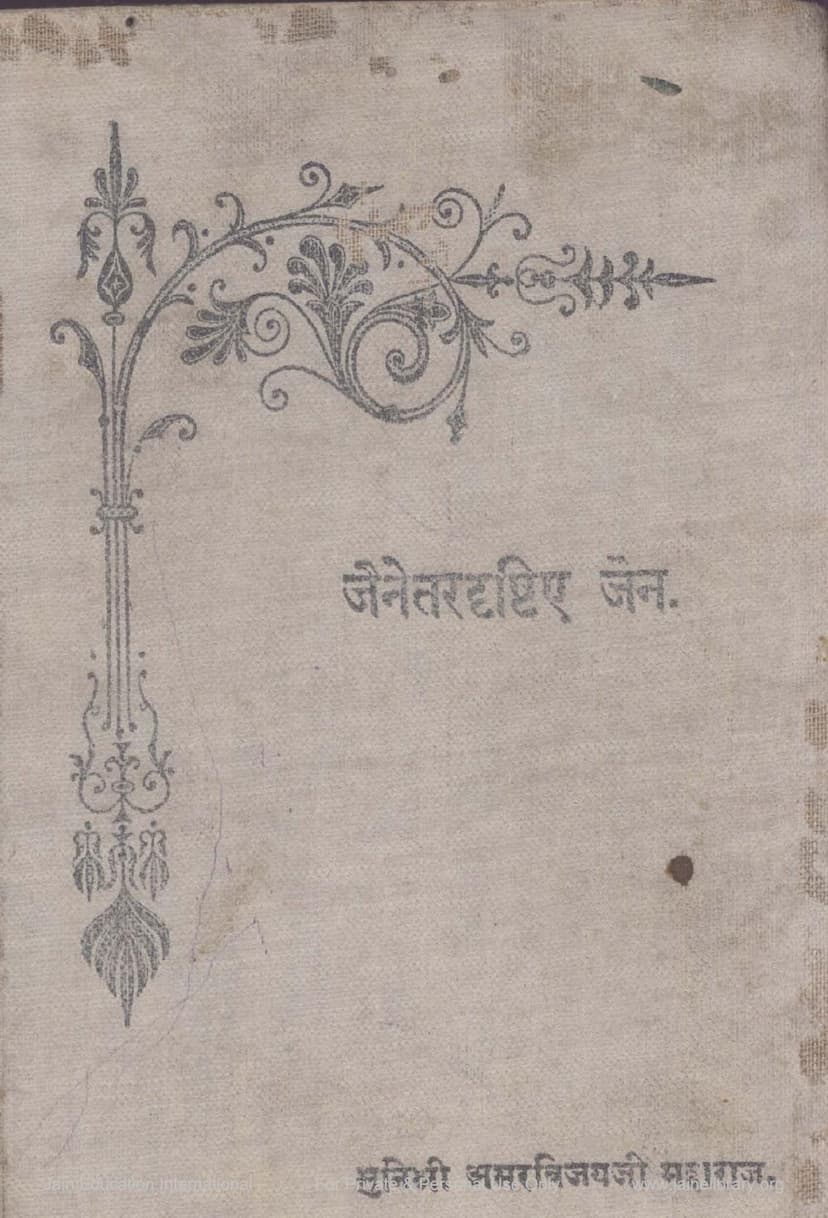Jainetar Drushtie Jain
Added to library: September 2, 2025

Summary
This Jain text, titled "Jainetar Drushtie Jain" (Jainism from a Non-Jain Perspective) by Munishri Amarvijayji, published by Dahyabhai Dalpatbhai, is a compilation of the opinions of various neutral scholars and intellectuals on Jainism.
The book aims to present Jainism through the eyes of non-Jains, highlighting its philosophical depth and ethical principles, as understood by those outside the immediate Jain tradition. The author, Munishri Amarvijayji, a disciple of Acharya Nyayanbhodhi Shrimad Vijayanandsurishwarji, compiles these views to provide a balanced and accessible understanding of Jainism to a wider audience.
The introductory sections and the numerous essays by various scholars, both Indian and European, emphasize the following key aspects of Jainism:
- Ancient Origins and Independence: Many scholars argue that Jainism is an independent religion, not a branch or offshoot of Hinduism or Buddhism. Its origins are traced back to very ancient times, predating many other major religious traditions.
- Philosophical Depth and Nuance: The text extensively discusses the core Jain philosophical concepts, particularly Syadvada (the doctrine of manifold perspectives) and Anekantavada (the principle of non-absolutism and multi-faceted reality). These are presented as sophisticated epistemological and ontological frameworks that avoid rigid dogmatism and encourage a more comprehensive understanding of truth.
- Ethical Principles: The paramount importance of Ahimsa (non-violence) in thought, word, and deed is consistently highlighted. This principle extends to all living beings, including microscopic organisms, and is seen as the foundation of Jain ethics and practice. The emphasis on self-control, detachment from worldly pleasures, asceticism, and self-discipline as paths to spiritual liberation is also a recurring theme.
- Critique of Earlier Traditions: Some scholars point out the perceived flaws in Vedic rituals, particularly the emphasis on animal sacrifice and the subsequent compromises made (like using dough-models of animals or advocating for vegetarianism) under the influence of Jain and Buddhist principles. The text suggests that Jainism, with its pure ethical code, played a significant role in the evolution of ethical thought in ancient India.
- Comparison with Other Religions: The book engages in comparative religion, discussing how Jainism's principles are viewed in relation to Hinduism (Vedic and Puranic traditions), Buddhism, and even Western philosophical thought. Many scholars acknowledge Jainism's unique contributions and distinctiveness.
- Testimonials from Diverse Scholars: The book includes a wide range of opinions from respected figures like:
- Indian Scholars: Vasudev Narhar Upadhye, Ramakrishna Sharma, Lokmanya Tilak, Kaka Kalelkar, Anandshankar Bapubhai Dhruv, Ravindra Nath Tagore, Swami Virupaksha Wadiyar, Muhammad Hafiz Sayyed, M.D. Pandey, and others. These scholars often express admiration for Jainism's antiquity, ethical rigor, and philosophical insights, sometimes even suggesting its influence on other traditions.
- European Scholars: Dr. Herman Jacobi, Dr. O. Pertold, Dr. L. P. Tessitori, Dr. Johannes Hertel, Dr. A. Guirnot, and others. These scholars, through their research on Jain scriptures and history, generally validate the antiquity and originality of Jainism, appreciating its sophisticated philosophy like Syadvada and its ethical foundation in Ahimsa.
- The Role of Mahavira: While acknowledging Mahavira as a pivotal figure, some scholarly interpretations suggest he was more of a reformer and systematizer of an ancient tradition rather than its absolute founder, aligning with the Jain belief in Tirthankaras.
- The Value of Jain Literature: The sheer volume and depth of Jain literature, covering philosophy, ethics, logic, astronomy, and grammar, are praised by several scholars, who see it as a rich repository of knowledge.
In essence, "Jainetar Drushtie Jain" presents Jainism as a profound, ancient, and ethically advanced religion, whose principles have been recognized and appreciated by learned individuals from various backgrounds, showcasing its universal appeal and philosophical sophistication.